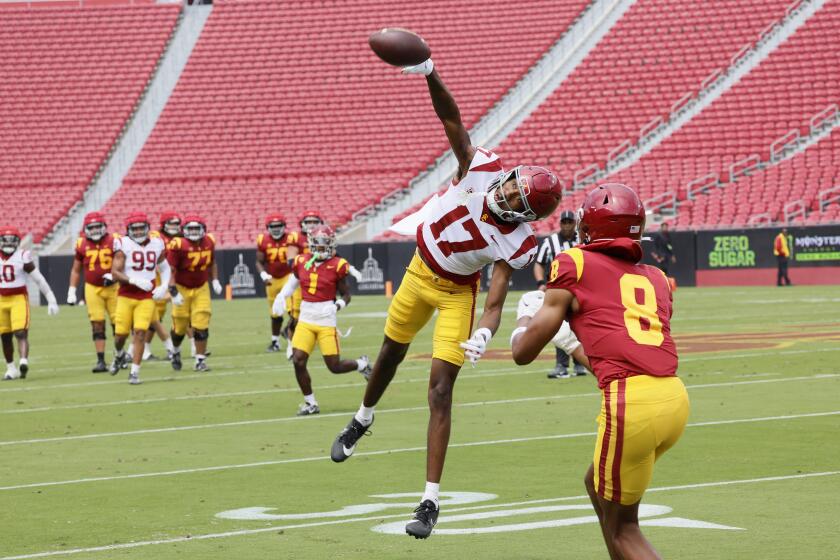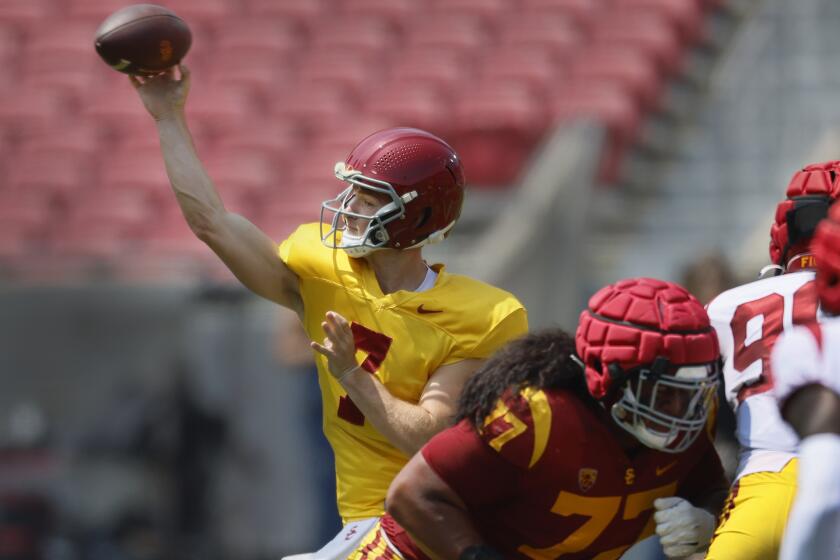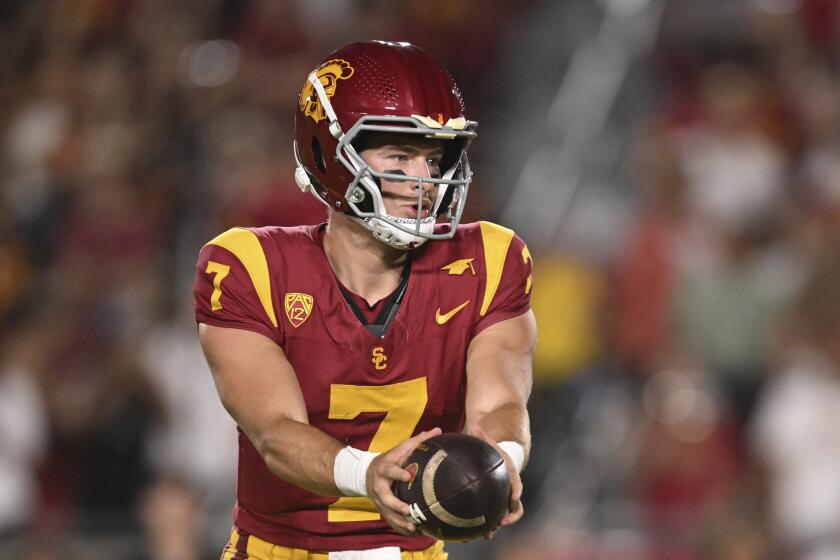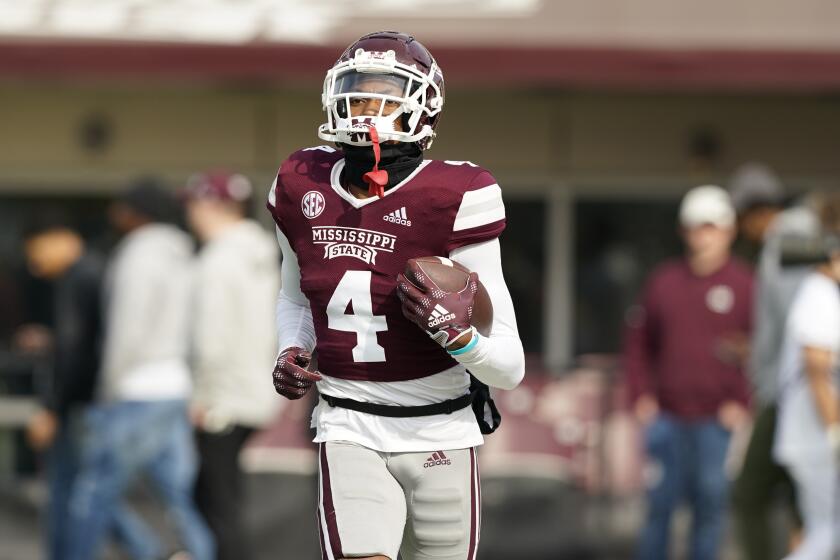USC isn’t happy with its No. 1 ranking in an unusual category. Where’s the luck?
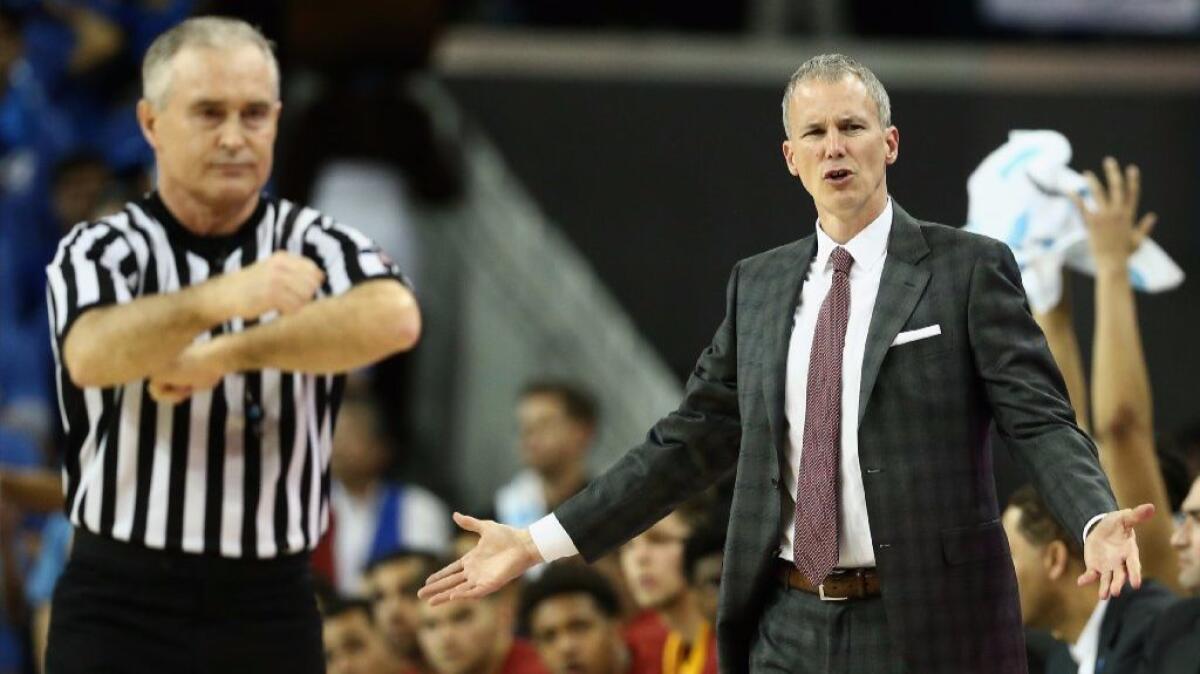
Andy Enfield, the coach of the luckiest team in the nation by one measure, has had a stressful two weeks.
It started two Saturdays ago, when his USC team lost a close game to No. 6 Oregon. The following Saturday, USC suffered an embarrassing 32-point loss to No. 5 UCLA on the road.
Now the Trojans must play No. 4 Arizona on Thursday in Tucson, where the Wildcats have won 69 of their last 70 games. It will be the only time this season that any team has faced a top-six opponent three games in a row.
Before leaving for Tucson this week, Enfield was informed that, amid all of this, USC had hit the summit on rankings in an unusual category: luck.
Ken Pomeroy, the statistician who has become an authority on college basketball, keeps a rating of the luckiest teams in college basketball. And, among 351 contenders, no team has been “luckier” than USC.
That is, USC’s actual record is more than three wins better than its statistical profile would suggest.
“We’re the No. 1 luckiest team?” Enfield said after practice Tuesday. “I do know that we’ve been in some close games this year, and we made plays to win.”
He thought for a moment and grew more animated.
“Bennie Boatwright’s been out 18 games, our leading scorer,” he continued. (Technically, Boatwright is 0.1 points per game off the team lead.) “Lauri Markkanen [of Arizona] banked a three in the last 38 seconds, and the official made a bad call against Oregon when it was out on them and it was a one-possession with 2 1/2 minutes left.”
Pause.
“So I think we’re the most unlucky team in the country,” he said. “How’s that?”
Pomeroy explained that his luck rating shows how successful a team has been in close games.
“The theory being that in the long run, you don’t have a lot of control over the outcomes of close games,” he said. “The better team usually wins a one-possession game, but the chances of the better team winning are like 55, 60%.”
Which is to say, a team that emerges with lots of close wins has been ... lucky.
The conclusion is backed up by thousands of games of evidence. The theory also chafes many coaches and players whose seasons and careers are often made on this razor’s edge. Coaches devote hours of practice to end-of-game situations. In their view, the point of the game is to win, and to do so a team has to make more plays, and to make more plays a team has to be good.
USC, which had close wins over Texas A&M, Southern Methodist and Colorado, among others, thinks it has been good.
Pomeroy’s formulas haven’t been as charitable. Pomeroy’s main contribution to basketball is his overall ratings, a predictive tool designed to measure how good a team is — as opposed to most rankings, which show how good a season it has had. The 21-6 Trojans are ranked 62nd, behind such teams as 16-11 Michigan State, 14-13 Clemson and 15-12 Georgia. The Ratings Percentage Index, which accounts for results and strength of schedule, ranks USC No. 31.
The low rank and the “lucky” label have fanned an already simmering feeling of resentment at the Galen Center. Shooting guard Elijah Stewart has stewed for years that USC is not taken seriously.
“USC,” he mused two weeks ago, “is like the Harry Potter of the Pac-12.”
He later noted that the fictional wizard “lived underneath a stairwell. That’s one of the greatest wizards ever! He got no love.”
USC is treated similarly, he said. Stewart believes that some fans and media members write off any USC success as a fluke. Some team members have cited USC’s win over No. 17 SMU in November, which received little attention at the time because SMU was then unranked.
“Whenever we beat a team, it’s always a bunch of excuses,” Stewart said. “ ‘Oh, this happened. My girlfriend broke up with me. Yadda, yadda, yadda.’ It’s always something. It’s just always an excuse. We don’t get the benefit of the doubt. Whenever we lose, ‘Oh, they were supposed to lose.’ Come on now, how does that work?”
Of Pomeroy’s ratings, Stewart said, “Unless Jesus runs that site, it’s not very credible to me. If you’re so good at telling the future, work for the government.”
Currently, the argument is theoretical. But it could soon affect a team’s seeding in the NCAA tournament. In January, the NCAA convened stats experts, including Pomeroy, to discuss new tools that the NCAA tournament selection committee can use to select teams.
Pomeroy told the Sporting News that he doesn’t think his ratings should be the defining feature for bracket selection. Wins and losses still matter, luck or not.
“It’s why you watch games,” he said. “You want to see teams win or lose.”
NEXT UP
USC AT NO. 4 ARIZONA
When: Thursday, 7 p.m. PST.
Where: McKale Memorial Center, Tucson.
On the air: TV: Pac-12 Networks; Radio: 710.
Update: USC (21-6, 8-6 in the Pac-12 Conference) watched film of its 102-70 loss to UCLA for two hours earlier this week, about twice as long as normal. There is no reprieve: Arizona (25-3, 14-1) sits atop the conference. ... Since the teams’ last meeting, USC has regained Boatwright, and the Wildcats have regained guard Allonzo Trier, who averages 13.9 points, 2.8 assists and 5.1 rebounds per game.
Follow Zach Helfand on Twitter @zhelfand
ALSO
UCLA is trying not to live in the past when it comes to USC
LaVar Ball’s boasts about sons, including UCLA star Lonzo, draw strong reactions
The creator of UCLA’s iconic Frisbee Cheer fondly remembers when he did it his way
Go beyond the scoreboard
Get the latest on L.A.'s teams in the daily Sports Report newsletter.
You may occasionally receive promotional content from the Los Angeles Times.

